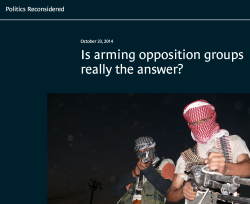 We have seen the consequences of such policy in recent conflicts in the Middle East in particular. For instance, in Syria, the power vacuum left behind by the exile opposition and the protracted nature of the struggle has produced a large number of resistance groups in the country that operate under no effective leadership. Some of these groups are armed, others remain as a civilian opposition to the Assad regime.
We have seen the consequences of such policy in recent conflicts in the Middle East in particular. For instance, in Syria, the power vacuum left behind by the exile opposition and the protracted nature of the struggle has produced a large number of resistance groups in the country that operate under no effective leadership. Some of these groups are armed, others remain as a civilian opposition to the Assad regime.
Today, the armed opposition groups, nominally under the banner of the Free Syrian Army (FSA), pose a legitimate challenge to the civilian opposition under the leadership of the Syrian National Council (SNC). The dependency of the population on the armed groups to provide security and the uncertain and changing motivations of these groups undermine the efforts of the SNC to establish itself as a viable civilian leader in the country.
Similarly, Libya after Gaddafi struggles with a large number of armed groups who control parts of the country as well as the resources in those parts, and challenge the new government’s legitimacy with their varying agendas and allegiances.